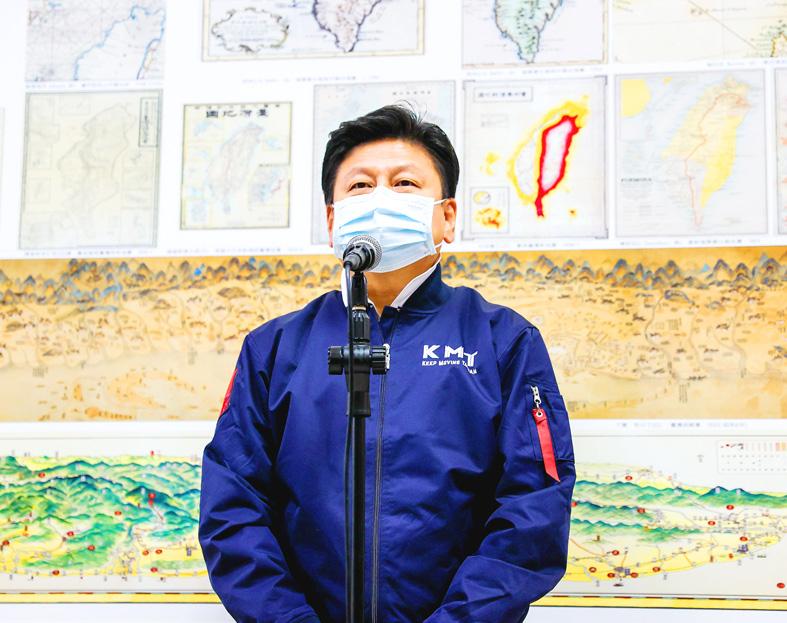The Chinese Nationalist Party (KMT) on Saturday elected 29 members to its Central Standing Committee, with Legislator Fu Kun-chi (傅崐萁) receiving the most votes.
Fu, who represents a constituency in Hualien County, was elected to the committee with 1,234 votes, the highest number among the 40 KMT members who were vying for a seat in the party’s top decisionmaking body.
A controversial figure in the opposition party, Fu had his KMT membership revoked in 2009 when he ran for Hualien County magistrate in defiance of the party’s request not to. He won the election.

Photo: CNA
Fu’s wife, Hsu Chen-wei (徐榛蔚), was selected as the party’s candidate for that position in 2018 and is now the county magistrate.
Fu’s strong backing in the committee vote was driven largely by his support for KMT Chairman Eric Chu (朱立倫), a party member said on condition of anonymity.
Fu has been assigned to several campaign posts in preparation for the local elections in November, the party member said.
The strong win indicated vigorous grassroots support, which greatly helps Fu’s efforts to organize the party’s campaign and recruit candidates, another KMT member who prefers anonymity said.
Six other incumbent legislators were among the 29 people elected on Saturday to the committee.
Among them were Nantou County Councilor Yu Hao (游顥) with 1,086 votes, former Tainan County Council Deputy Speaker Chen Tsung-hsing (陳宗興) with 1,049 and Legislator-at-Large Wu I-ding (吳怡玎) with 987.
The newly elected committee members are expected to assume their posts on Wednesday.

POSITIVE DEVELOPMENT: Japan and the US are expected to hold in-depth discussions on Taiwan-related issues during the meeting next month, Japanese sources said The holding of a Japan-US leaders’ meeting ahead of US President Donald Trump’s visit to China is positive news for Taiwan, former Japan-Taiwan Exchange Association representative Hiroyasu Izumi said yesterday. After the Liberal Democratic Party’s landslide victory in Japan’s House of Representatives election, Japanese Prime Minister Sanae Takaichi is scheduled to visit the US next month, where she is to meet with Trump ahead of the US president’s planned visit to China from March 31 to April 2 for a meeting with Chinese President Xi Jinping (習近平). Japan and the US are expected to hold in-depth discussions on Taiwan-related issues during the

‘LIKE-MINDED PARTNER’: Tako van Popta said it would be inappropriate to delay signing the deal with Taiwan because of China, adding he would promote the issue Canadian senators have stressed Taiwan’s importance for international trade and expressed enthusiasm for ensuring the Taiwan-Canada trade cooperation framework agreement is implemented this year. Representative to Canada Harry Tseng (曾厚仁) in an interview with the Central News Agency (CNA) said he was increasingly uneasy about Ottawa’s delays in signing the agreement, especially as Ottawa has warmed toward Beijing. There are “no negotiations left. Not only [is it] initialed, we have three versions of the text ready: English, French and Mandarin,” Tseng said. “That tells you how close we are to the final signature.” Tseng said that he hoped Canadian Prime Minister Mark Carney

President William Lai (賴清德) yesterday bestowed one of Taiwan’s highest honors on Saint Vincent and the Grenadines (SVG) Ambassador Andrea Clare Bowman in recognition of her contributions to bilateral ties. “By conferring the Order of Brilliant Star with Grand Cordon on Ambassador Bowman today, I want to sincerely thank her, on behalf of the Taiwanese people, for her outstanding contribution to deepening diplomatic ties between Taiwan and SVG,” Lai said at a ceremony held at the Presidential Office in Taipei. He noted that Bowman became SVG’s first ambassador to Taiwan in 2019 and

A man walks past elementary school artworks at the Taipei Lantern Festival in Ximen District yesterday, the first day of the event. The festival is to run from 5pm to 10pm through March 15.